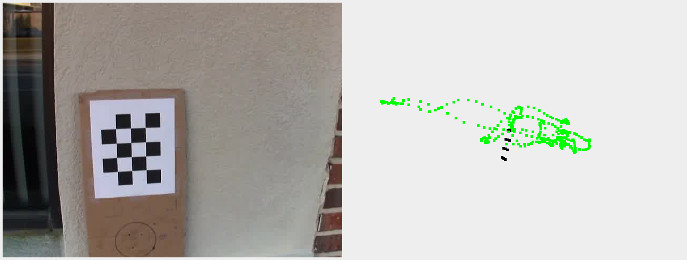Example Calibration Target Pose
From BoofCV
Jump to navigationJump to searchIn addition to calibration, calibration targets can be used to estimate the pose of objects in the scene to a high degree of accuracy. The location of calibration points can be estimated to a high degree of accuracy in the image making this approach more accurate than more generate purpose fiducials. How accurate is a function of distance and orientation.
Example Code:
Concepts:
- Calibration target
- Pose estimation
Related Examples:
Videos
Example Code
/**
* The 6-DOF pose of calibration targets can be estimated very accurately[*] once a camera has been calibrated.
* In this example the high level FiducialDetector interface is used with a chessboard calibration target to
* process a video sequence. Once the pose of the target is known the location of each calibration point is
* found in the camera frame and visualized.
*
* [*] Accuracy is dependent on a variety of factors. Calibration targets are primarily designed to be viewed up close
* and their accuracy drops with range, as can be seen in this example.
*
* @author Peter Abeles
*/
public class ExamplePoseOfCalibrationTarget {
public static void main( String args[] ) {
// Load camera calibration
CameraPinholeRadial intrinsic =
CalibrationIO.load(UtilIO.pathExample("calibration/mono/Sony_DSC-HX5V_Chess/intrinsic.yaml"));
LensDistortionNarrowFOV lensDistortion = new LensDistortionRadialTangential(intrinsic);
// load the video file
String fileName = UtilIO.pathExample("tracking/chessboard_SonyDSC_01.mjpeg");
SimpleImageSequence<GrayF32> video =
DefaultMediaManager.INSTANCE.openVideo(fileName, ImageType.single(GrayF32.class));
// DefaultMediaManager.INSTANCE.openCamera(null, 640, 480, ImageType.single(GrayF32.class));
// Let's use the FiducialDetector interface since it is much easier than coding up
// the entire thing ourselves. Look at FiducialDetector's code if you want to understand how it works.
CalibrationFiducialDetector<GrayF32> detector =
FactoryFiducial.calibChessboard(new ConfigChessboard(4, 5, 0.03),GrayF32.class);
detector.setLensDistortion(lensDistortion,intrinsic.width,intrinsic.height);
// Get the 2D coordinate of calibration points for visualization purposes
List<Point2D_F64> calibPts = detector.getCalibrationPoints();
// Set up visualization
PointCloudViewer viewer = new PointCloudViewer(intrinsic, 0.01);
// make the view more interest. From the side.
DMatrixRMaj rotY = ConvertRotation3D_F64.rotY(-Math.PI/2.0,null);
viewer.setWorldToCamera(new Se3_F64(rotY,new Vector3D_F64(0.75,0,1.25)));
ImagePanel imagePanel = new ImagePanel(intrinsic.width, intrinsic.height);
viewer.setPreferredSize(new Dimension(intrinsic.width,intrinsic.height));
PanelGridPanel gui = new PanelGridPanel(1,imagePanel,viewer);
gui.setMaximumSize(gui.getPreferredSize());
ShowImages.showWindow(gui,"Calibration Target Pose",true);
// Allows the user to click on the image and pause
MousePauseHelper pauseHelper = new MousePauseHelper(gui);
// saves the target's center location
List<Point3D_F64> path = new ArrayList<>();
// Process each frame in the video sequence
Se3_F64 targetToCamera = new Se3_F64();
while( video.hasNext() ) {
// detect calibration points
detector.detect(video.next());
if( detector.totalFound() == 1 ) {
detector.getFiducialToCamera(0, targetToCamera);
// Visualization. Show a path with green points and the calibration points in black
viewer.reset();
Point3D_F64 center = new Point3D_F64();
SePointOps_F64.transform(targetToCamera, center, center);
path.add(center);
for (Point3D_F64 p : path) {
viewer.addPoint(p.x, p.y, p.z, 0x00FF00);
}
for (int j = 0; j < calibPts.size(); j++) {
Point2D_F64 p = calibPts.get(j);
Point3D_F64 p3 = new Point3D_F64(p.x, p.y, 0);
SePointOps_F64.transform(targetToCamera, p3, p3);
viewer.addPoint(p3.x, p3.y, p3.z, 0);
}
}
imagePanel.setImage((BufferedImage) video.getGuiImage());
viewer.repaint();
imagePanel.repaint();
BoofMiscOps.pause(30);
while( pauseHelper.isPaused() ) {
BoofMiscOps.pause(30);
}
}
}
}
